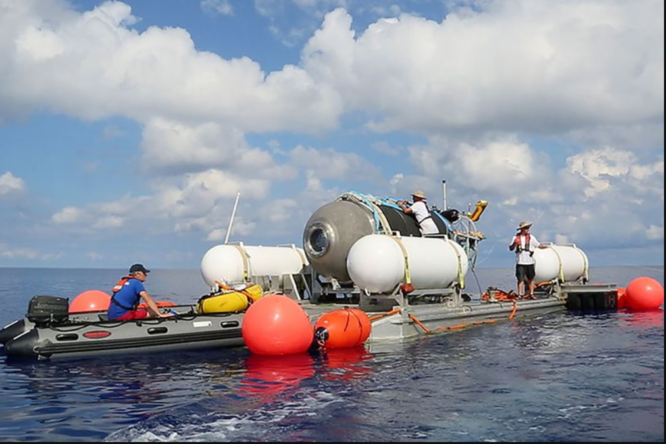A veteran senior admiral stated there is a “vanishingly small” prospect of locating the Titanic submarine. The US Coastguard reported sounds in the search area on LBC.
However, former UK navy rear admiral Chris Parry said without a “emitting signal” from the missing deep-sea craft near the Titanic crash site, it will be “impossible” to detect in the timeline.
He called it “fundamentally dangerous” to dive thus deep in the Atlantic Ocean in a “dodgy piece of technology.” “I’m afraid the odds are vanishingly small,” the former Ministry of Defence Director General of Development, Concepts, and Doctrine told LBC.
We want to be positive, but discovering the object and getting it off the seafloor are two major issues. It’s never been done, and I don’t think anyone knows how to accomplish it.”
He added: “You’ve got this vastly complex seabed with all the debris of the Titanic, hills and canyons and everything, and I’m afraid to say without an emitting signal from the vehicle itself it’s almost, well, I’d say it’s impossible to find in the timescale.

Why anybody would use a questionable piece of equipment that requires you to sign away your right to sue the firm for emotional harm, injury, or death is beyond me.
It’s hazardous, experimental, and hubris-inducing.
Titan, a submersible, lost contact with tour organizers on Sunday while traveling to the wreckage off Canada’s coast 435 miles south of St. John’s, Newfoundland. Titan, a 6.7-metre (22-foot) OceanGate Expeditions yacht with five people, including British millionaire explorer Hamish Harding, has 40 hours of oxygen left on Tuesday, according to the US Coast Guard.
Shahzada Dawood, his son Suleman, OceanGate CEO and founder Stockton Rush, and French submersible pilot Paul-Henry Nargeolet are on board.
“Canadian P-3 aircraft detected underwater noises in the search area,” the US Coast Guard tweeted. To investigate the noises, ROV operations were moved. Although unsuccessful, ROV searches continue.
“Additionally, our U.S. Navy experts have analyzed the P-3 aircraft data for future search plans.”
Hamish Harding’s pal calls him “the quintessential British explorer” as the Titan quest continues. mColonel Terry Virts, a former International Space Station commander, told Nick Robinson on Today about Mr. Harding’s love of adventure.
“Some people watch Netflix and some people play golf, and Hamish goes to the bottom of the ocean or into space or sets world records flying around the planet,” he remarked. Hamish is the archetypal British adventurer. He’s adventurous. Exploration is his nature.”
Colonel Virts said, “No, not all.”
“Hamish isn’t an adrenaline junkie. Not Hamish. He’s curious. Exploration is risky, but he’s methodical.”


